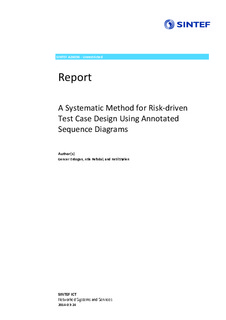A Systematic Method for Risk-driven Test Case Design Using Annotated Sequence Diagrams
Research report

View/
Date
2014Metadata
Show full item recordCollections
- Publikasjoner fra CRIStin - SINTEF AS [5801]
- SINTEF Digital [2501]
Abstract
Risk-driven testing is a testing approach that aims at focusing the testing on the aspects or features of the system under test that are most exposed to risk. Current risk-driven testing approaches succeed in identifying the aspects or features that are most exposed to risks, and thereby support testers in planning the testing process accordingly. However, they fail in supporting testers to employ risk analysis to systematically design test cases. Because of this, there exists a gap between risks, which are often described and understood at a high level of abstraction, and test cases, which are often defined at a low level of abstraction. In this report, we bridge this gap. We give an example-driven presentation of a novel method, intended to assist testers, for systematically designing test cases by making use of risk analysis. Oppdragsgiver: Norwegian Research Council